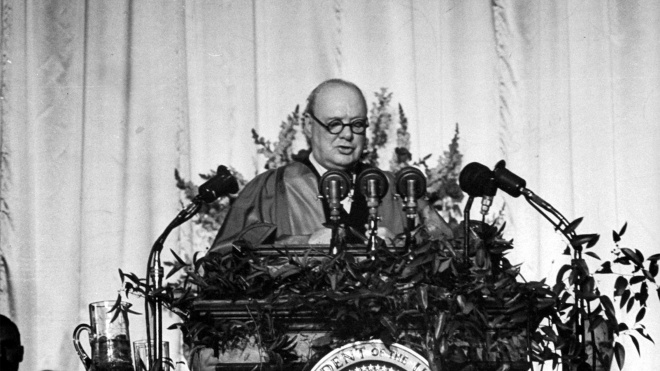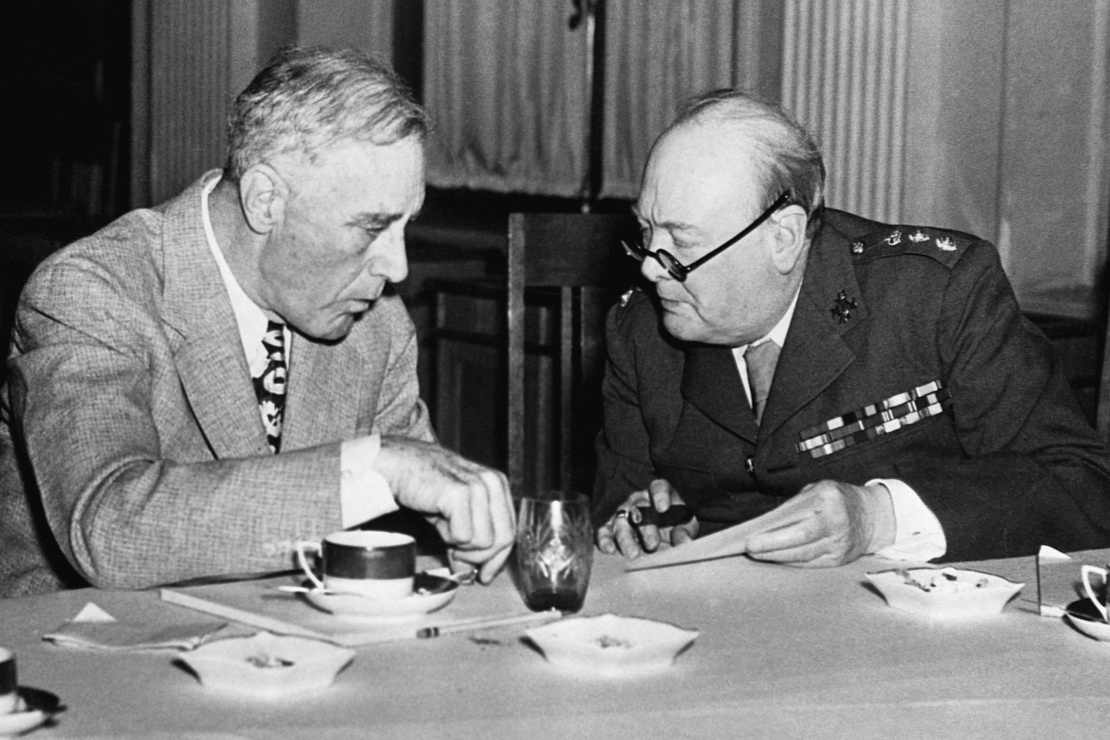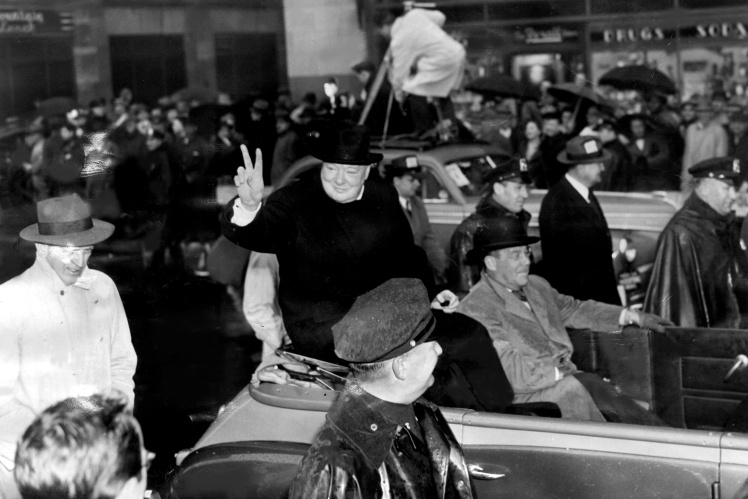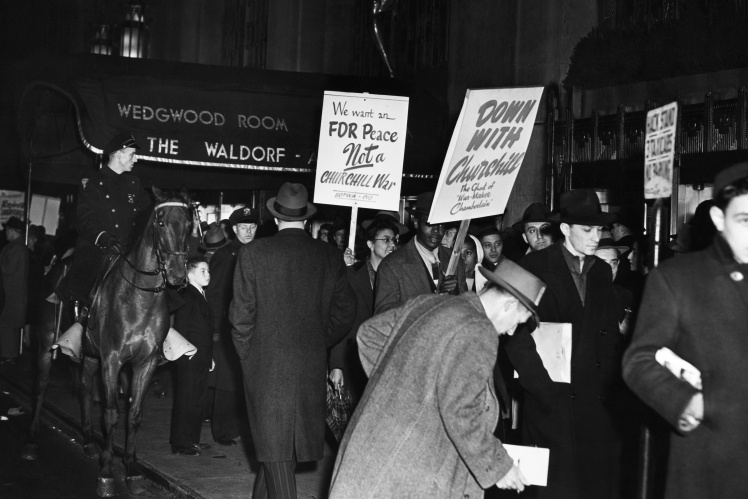In 1945, people around the world rejoiced at the end of a terrible world war. It was completed even earlier than planned. After the capitulation of Germany in May, it was predicted that Japan would remain at war at least until 1946.
At the beginning of 1945, the then British Prime Minister Winston Churchill also hoped for peace. But, of course, not for a simple peace, but under the strict supervision of the "big three" winners — the United States, Great Britain and the Soviet Union. Even after the conference of the leaders of the three powers in Yalta in February of the same year, Churchill was full of optimism. He believed that by joint efforts they and the USA would at least somehow manage to keep the Soviet dictator Stalin under control. In particular, to prevent Soviet expansion in Eastern Europe.
Roosevelt and Churchill during negotiations in Yalta, February 1945.
Getty Images / «Babel'»
It would seem that, politically, everything was going according to Churchillʼs plan. US President Franklin Roosevelt, contrary to unspoken American tradition, won the presidential election for the fourth time in a row in the fall of 1944. All that remained was to win the parliamentary elections in Britain against the background of the unprecedented popularity that Churchill had gained during the Second World War.
But before the next meeting of the "Big Three" in Potsdam in July 1945, everything went awry. In April, Roosevelt died right in his office. The new head of the White House, Harry Truman, inherited the presidency as vice president. He had no experience in big politics and, of course, did not have time to work out a common position with Churchill before the meeting with Stalin.
Churchill himself was so engrossed in foreign policy that he completely forgot about domestic policy. He remained a wartime politician, and British society demanded peace-time reforms. In the end, Churchill unexpectedly lost the parliamentary elections, was forced to resign as Prime Minister and leave Potsdam in the midst of negotiations. He was replaced by Laborist Clement Attlee, who himself did not believe in his victory.
Pictured are seated from left to right: British Prime Minister Clement Attlee, who replaced Churchill at the conference, US President Harry Truman and Soviet dictator Joseph Stalin, Potsdam, 1945.
Getty Images / «Babel'»
Instead, Stalin took advantage of the disunity of the West and not only maintained, but also improved his position. He laid the preconditions for the transformation of European countries occupied by the Soviet army into a social camp with puppet regimes. Bargained substantial reparations from Germany, officially included Koenigsberg and Polish territories in the USSR.
After the election defeat, Churchillʼs conservative party went into opposition. The ex-prime minister himself was not going to leave big politics. However, at the end of 1945, at the insistence of doctors, he decided to take a leave of absence. He was recommended to go to a region with a warm climate, and Churchill chose the American Florida. In mid-January 1946, he and his wife Clementine arrived in Miami, the last time they vacationed together before the beginning of World War II. Later, their daughter Sarah joined them.
Churchill with his wife and daughter in Miami, March 1, 1946.
Getty Images / «Babel'»
For six weeks, Churchill conscientiously rested — he sunbathed, painted landscapes on the beaches, and went to Cuba with his family. Local newspapermen were warned not to bother the ex-prime minister, because he had come to rest. And he will attend only a few official events. However, Churchill was often approached by people on the streets and asked for his autograph, and paparazzi photographed him during walks and at the easel. He was no less popular in the United States than in Britain, especially after his historic speech to Congress in December 1941.
Churchill painting on Miami Beach surrounded by photographers, January 26, 1946.
Getty Images / «Babel'»
Despite his rest, Churchill followed world events. He, of course, paid attention to Stalinʼs speech in Moscow on February 9, 1946. The essence of the speech of the Soviet dictator was as follows: yes, the USSR won the Second World War together with Britain, the USA and other allies, but without Soviet help they would not have coped with it; the war proved that the Soviet system is the best of all forms of social organization; in general, fascism arose in capitalist countries, they unleashed the Second World War, as well as the First World War; and the USSR was always peaceful, democratic and never supported any aggressor. So, most likely, Stalinʼs statements influenced Churchill while preparing for his speech.
Footage from Stalinʼs speech on February 9, 1946.
Getty Images / «Babel'»
The ex-prime minister came to the States not only for recreation. He hoped to establish relations with American President Truman, whom he had met only once during the failed Potsdam Conference.
Back in October 1945, Churchill received a letter from the president of Westminster College in the small town of Fulton, Missouri, inviting him to give a lecture on international relations. The president of a small college could hardly have expected a visit from Churchill if another president had not personally written a postscript to the letter: “This is a great college in my home state. I hope you can come. I will introduce you. Best regards, Harry Truman." Ever since Potsdam, the White House has not been able to develop a clear strategy for negotiations with the USSR. And a better expert than Churchill could not be found.
The former British prime minister, of course, accepted the invitation. And in general, he joked that he could not refuse a college with "a rather familiar name that reminds me of the place where I acquired skills in politics, rhetoric and dialectics." He alluded to the Palace of Westminster, where the Parliament of Great Britain sits. At the beginning of March 1946, Churchill arrived in Washington, and from there, together with Truman, took the presidential train to Fulton.
Churchill and Truman in the presidential train, March 1946.
Getty Images / «Babel'»
While still on the train, Churchill and Truman began "poker diplomacy," that is, discussing business over a game of poker. The American president was a great player and constantly outplayed the British. Finally, when Churchill briefly left the compartment, Truman addressed his entourage: “Look, weʼve got to let the old man win. Because this is a very important person for the world." Although it was rumored that Churchill was also a good card player and deliberately succumbed to the American.
The arrival of Churchill together with the President of the United States became a grand event for the town with a population of about ten thousand. Another 20,000 people came to Fulton to hear the British politician speak. The hall at the college, of course, could not accommodate everyone, so most crowded outside, listening to the talk on the radio. First, Churchill thanked for conferring the title of Doctor of Westminster College and warned that he was speaking as a private person.
Truman introduces Churchill before his speech in Fulton, March 5, 1946.
Getty Images / «Babel'»
Churchill spoke about the "special relationship" between the United States and Great Britain. He thanked the United States, which twice saved Europe and the world, "against its wishes and traditions." And now, to prevent new wars, they need to unite with Britain and other countries under the auspices of the new United Nations. Churchill had high hopes for the UN, saying that it needed its own international armed forces to maintain peace. However, he warned that it is still too early to put nuclear weapons at its disposal. After all, the organization is still "in its infancy." He then spoke about new threats to the world. And it was this part of his speech that became historic.
"From Szczecin on the Baltic to Trieste on the Adriatic, an iron curtain has descended on the continent," Churchill said of the European countries under the control of the Kremlin. “Communist parties, which were very few in all Eastern European states, came to power and gained unlimited totalitarian control. Police governments dominate almost everywhere, and at the moment, apart from Czechoslovakia, there is no real democracy anywhere." In addition to Europe, he named other potential hotspots in the Middle and Far East.
In yellow is the "Iron Curtain" in Europe, as depicted by Churchill in the Fulton speech.
Wikimedia
The only way to prevent "war and tyranny", the communist threat to "freedom and democracy" was to be a strong and united position of the West. First of all, the "fraternal union of all moral and material forces" of Britain and the USA.
But the most important thing, which many still do not pay attention to, is that Churchill did not call for war with the Soviet Union. On the contrary, he said that "the Russians donʼt want war either," so it is necessary to "overcome numerous differences in the name of establishing strong friendship." However, "nobody knows what Soviet Russia and its communist international organization are planning in the immediate future, what limits, if any, there are to their expansion and proselytizing tendencies." That is why he called on the West to unite in trying to come to an understanding with the USSR.
"From what I have observed in the behavior of our Russian friends and allies during the war, I am convinced that they respect nothing so much as strength and despise nothing so much as military weakness," said Churchill.
Footage of Churchillʼs speech in Fulton, March 5, 1946.
Getty Images / «Babel'»
Churchillʼs speech had an explosive effect all over the world. After all, for the general public, the countries of the West and the Soviet Union still remained allies in the anti-Hitler coalition. Opinions in the American press were divided. Some newspapers wrote that Churchill really opened the worldʼs eyes to a new threat. Others believed that Churchill sought British world domination with the help of American weapons. And one of the oldest and most influential British newspapers, The Times, generally wrote that Churchill "expresses the opinion exclusively of the American citizen and representatives of the United States government."
In fact, there was no unity among the Americans either. Some greeted Churchill with ovations in New York, where he had come from Fulton. Others picketed outside his hotel, chanting that the British were dragging the US into another war.
Churchill shows his famous "Victoria" gesture to people who greet him in New York on March 15, 1946. Protesters outside the hotel in New York where Churchill stayed, March 1946.
Getty Images / «Babel'»
Churchillʼs speech was the best gift for Soviet propaganda. Already on March 12, the Soviet Pravda newspaper published an article entitled "Churchill is rattling his weapons", and a few days later — Stalinʼs lengthy response. The Soviet dictator declared about "inciting enmity between allies and calls for war with the USSR", promised to "break the British, as it was during the intervention of the Entente", and generally went so far as to call Churchill "the new Hitler, who professes the racial superiority of the English-speaking nations".
Using the opportunity, the Soviet regime began to tighten the screws in the occupied European countries. In February 1947, the communists came to power in the elections in Poland, held under the muzzle of Soviet weapons. Later, the same thing happened in Hungary, Bulgaria and Romania. And when a similar trick could not be pulled off in Czechoslovakia, in February 1948, local communists with the support of the Kremlin staged a mutiny there and seized power. In June of the same year, Soviet troops blockaded West Berlin, which was under the control of the United States, Great Britain and France.
Footage of the air corridor during the blockade of West Berlin in 1948-1949.
Getty Images / «Babel'»
In the Far East, the USSR supported Mao Zedongʼs communists, who seized power in mainland China. And in Korea, it unleashed a war that divided the peninsula into two hostile states. Churchillʼs dream of cooperation with the USSR within the framework of the UN was impossible to dream of. So the countries of the West created a new military-political alliance — NATO.
On the seventh anniversary of the Fulton speech, March 5, 1953, Stalin died. After that, Churchill, who at that time returned to the prime ministerʼs chair, began to call on the West to try to negotiate with Moscow in a new way.
"A new hope has arisen in an unhappy, confused world. If we fail to take advantage of the precious chance of this moment, we will be severely judged by future generations," he wrote to then US President Dwight Eisenhower. But the United States was not up to that, it was there that the peak of the fight against the "red menace" was at both the external and internal levels. So Eisenhower abandoned the policy of negotiation.
Churchillʼs Fulton speech went down in history as the "Iron Curtain speech" and is still associated with the beginning of the Cold War. But in fact the speech was called Sinews of Peace, that is, "efforts for peace".
A bronze statue of Churchill to be erected outside Westminster College to mark the 25th anniversary of the Fulton Speech, 1971.
Getty Images / «Babel'»
Translated from Ukrainian by Anton Semyzhenko.
Churchill called the free press the most dangerous enemy of tyranny. So support Babel with a donation: 🔸 in hryvnias, 🔸 Buy Me a Coffee, 🔸 Patreon, 🔸 PayPal: [email protected].



